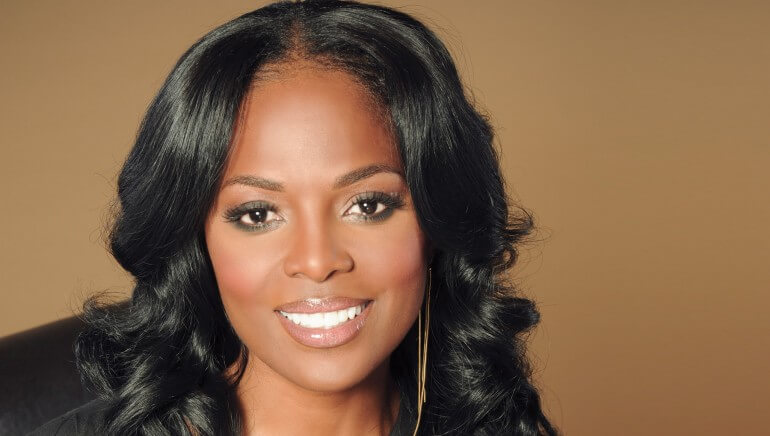Radio Facts:
Radio Facts: Catherine Brewton was featured in our 2015 issue of Celebrating Women of Color in Media – Originally posted July 11, 2018

Catherine Brewton is an industry vet and advocate for music’s thriving creative community. She directs all of BMI Atlanta’s office outreach to songwriters and music publishers while working closely with Writer/Publisher staff members in New York, Los Angeles, Nashville and London to bring top songwriters, producers and artists to BMI. She participates in educational, networking and showcase events, specifically designed to inform and elevate up-and-coming and established songwriters alike. She produces and hosts many of BMI’s marquee annual events, including the BMI R&B/Hip Hop Awards, the Trailblazers of Gospel Music Awards, installments of BMI’s popular “How I Wrote That Song” panel series. She also served as the executive producer for the BMI Trailblazers of Gospel Music Live 2013 album release and the television airing of the BMI Trailblazers of Gospel Music Awards. She’s been recognized in several publication features including Ebony magazine’s “Power 100” issue and the Hollywood Reporter “10 Grammy Greats” spread.
RF: Let’s talk about a few of the things that go into the process of you finding songwriters – some of the trends that are taking place. What is it about a new writer that grabs your attention, maybe using a situation that happened recently?
CB: It’s always about a melody. One of the most prolific songwriters I’ve encountered in the past few years that I think is just a gem is Grace Sewell. Grace is an Australian kid who moved to Atlanta about two years ago at 16. Upon my first entrée to her, she was a girl who really was not very sure of herself. But she wrote a song when she was 14 called “Boyfriend Jeans.” They laid the vocal down then she sang. I was blown away! It’s amazing how much the European culture has absorbed and studied our music. They’ve become so efficient and skilled at delivering our music, in some cases, better than we are. At 15/16, this young girl is talking about Aretha Franklin and Whitney Houston, and so many great voices that our kids don’t even listen to. I thought, “Grace is going to absolutely be a force to be reckoned with because not only is she a great songwriter but to be great you have to study the greats.” You can’t come into the game and say, “I’m going to compete with the Mariah’s and Whitney’s” and all you can talk about is what has happened in the last two years, musically. Grace now has an EP that is probably 80,000 in. She’s already had a number one record, “You Don’t Own Me.” Quincy Jones took her under his wings and helped groom her. So this young lady is poised for greatness.
RF: When you attend an event, on average, how many times are you approached?
CB: Oh, my God. It’s daunting sometimes because every time I’m out, it’s not in the capacity of wanting to be solicited – though I don’t ever NOT talk to people. But I was at this recent Radio One event on Monday and Cathy Hughes and I happened to be seated with Alfred, L.A. Reid and Sylvia Rhone – my heroes. People just don’t know how to set boundaries. Obviously, if I’m in Ms. Hughes’ company you shouldn’t walk up and say, “Can I take a picture with you?”
You have to understand that this woman changed the landscape of radio and the industry with Radio One. Then she said, “Hey, I’m going to start a TV station,” and TV One is now one of the premier African American networks on cable television. People don’t take the time to know who we are, where we came from and the great strides that the Cathy’s and L.A.’s have made. They don’t know how hard they persevered to blaze trails for us coming behind them.
RF: You have to constantly recreate and reinvent. I want to ask you about the current way songwriters are paid. Do you feel that’s archaic?
CB: I was talking to someone about the whole recent digital change – some of the decisions that I don’t want to get into because it’s a moving target as we speak – but archaic is one aspect. If you look at the pool of money going out the door, say, from BMI’s standpoint, traditional radio still is the lion’s share of the pie. People could say, “Yeah but most of the content is being consumed digitally,” but the money doesn’t dictate that, at this point, in terms of what’s going out to the creator. So as much as we can talk about digital, radio is not going away. Spotify, Apple, YouTube – all of these mediums are trying to figure out how to close the gap. Until then, traditional radio is still the biggest income source for a lot of songwriters. Until digital platforms figure out how to fairly monetize the creators, we can’t dismiss what is known or what people are referring to as archaic measures.
RF: What do you think of industry entrepreneur Baby and the recent Cash Money transaction with Apple?
CB: Absolutely brilliant. I’ve said this a thousand times: you can never count Cash Money out. Number one, Baby might be one of the most brilliant hip-hop guys in the game in terms of putting records together. Hands down, you can’t sell six/seven hundred million and not be that. Two, Baby’s business acumen, whatever people think or don’t think, he always knows how to get the business done. This Apple deal speaks, once again, to how brilliant he is.
RF: Older consumers often complain about the lost art of great songwriting. In comparison to the ‘70’s, ‘80’s and ‘90’s, are we becoming our parents or is there some legitimacy to that?
CB: I certainly don’t think that we’re seeing the volume of great talent we did in the ‘70’s, ‘80’s and ‘90’s, There are jewels like Beyoncé, Drake is brilliant, Kendrick Lamar is really talented, and Adele is super phenomenal. There is definitely talent coming out in this era but when you look at the masses, it’s not necessarily my cup of tea in a broad stroke. But I would not say it’s a lost cause. Also, this generation moves on too fast. They don’t live with talent, allow talent to cultivate and build to become superstars. Everything’s one hit and they’re gone or maybe there’s a second record and gone. You don’t see the longevity.
RF: How does BMI stand out from other
performance rights organizations like SESAC and ASCAP? What’s your specialty?
CB: I think that they’re all incredible organizations. What I will say about BMI, and I think that’s why I’ve been here as long as I’ve had, is that we’re a relationships company. I answer my phone. I sometimes find it hard to disconnect. I’m getting better at that but we built our business on an open door policy. Starting my career in the late ‘90’s here, I thought, “What do you mean open door? Anybody can walk in?” And pretty much, yes. That’s not as prevalent now because there are so many weirdos out there.
RF: How do people submit to you these days and what is the actual best way?
CB: Email. And we’ve got a website where people can also submit.
RF: When it comes to the U.S. music scene and technology, do you think that industry meccas such as Atlanta, New York, and L.A. will become oblivious? Will there be an opportunity to become a star from anywhere in the country?
CB: If you’ve got the God-given talent, you can be a star from wherever you reside. Now, are you more inclined to work harder if you’re in Atlanta for hip-hop, R&B and now film…or in Nashville for country, rock, and now to a greater extent, Gospel and Christian music…or in L.A. for film, TV, pop or R&B…or New York which is now not as vibrant in recording because a lot of the studios are gone but the publishers, labels and technology companies are there. You stand a greater chance of getting involved with more work if you’re in those places but I would certainly not count someone out because they are in Charlotte or Birmingham. Things are happening everywhere. I often tell people, “Be successful where you live. If you can capture your own marketplace, at least you know you have that fan base. If you go somewhere else, you’re going to be competing with the big dogs. So at least capture your own marketplace.”
RF: What do you think about Chance the Rapper refusing to sign a major label deal?
CB: Brilliant. Here again, is the reality of that situation. When he did this live deal with Apple Music, one of my guys was listening and I said, “Who are you listening to?” I ended up tuning in and was blown away. Number one, he’s freaking brilliant – brilliant, brilliant!! Articulate. There is a gospel feel to his music but he understands who he is, what he needs to do and what his messaging needs to be. I applaud him for understanding that the building can’t do anything different than what he’s doing. Creatively, he wants the freedom to be able to roll it out the way he wants to roll it out. He and his project are being referred to as “critically acclaimed.” He’s my hero because he’s defining the system. The system is always, “You’ve got to have a label deal and you’ve got to do this, this and this. Chance is like, “No. I don’t have to do anything. I’m going to do it this way. If I sell ten thousand or two thousand or two million, it doesn’t matter. This is how it’s going to roll out and I’m completely okay with the end result.”
RF: Talk a little about the TV One segment that you did.
CB: “Trailblazers” was an iconic moment I one thousand percent applaud. I flew to D.C. and took a car to Maryland to sit down with Ms. Hughes. Over the course of the years, we talked about taking Trailblazers to TV One. They had some changes in leadership at TV One. Brad Siegel went in. Brad and I worked together on “Trailblazers” for Gospel Music Channel; I aired the show with him for two or three years. So when he came in, Brad’s direction was more original programming and I totally understood that.
Ms. Hughes was a big champion. She literally walked me into his office and said, “Brad, I want to do this.” And he said, “Ms. Hughes, what do I do? It’s coming from you? It has to be done.” It was a major, major, major learning curve because presenting live content for a room, versus presenting live content for TV is two totally different animals. My team and I walked away from it knowing that you have to control every component. We controlled the creative and TV One brought in their production crew. There were just some misconnects, big time, in terms of what we thought we were getting versus reality.
The beautiful thing is that, in the end, the content was pretty flawless and we ended up having an incredible show. It was the first time in history for a gospel award show to trend in seven, eight countries and, I want to say 15, 20 million impressions. It was also the first time that a gospel awards show got the same number of eyeballs on the first airing as on the second.



















